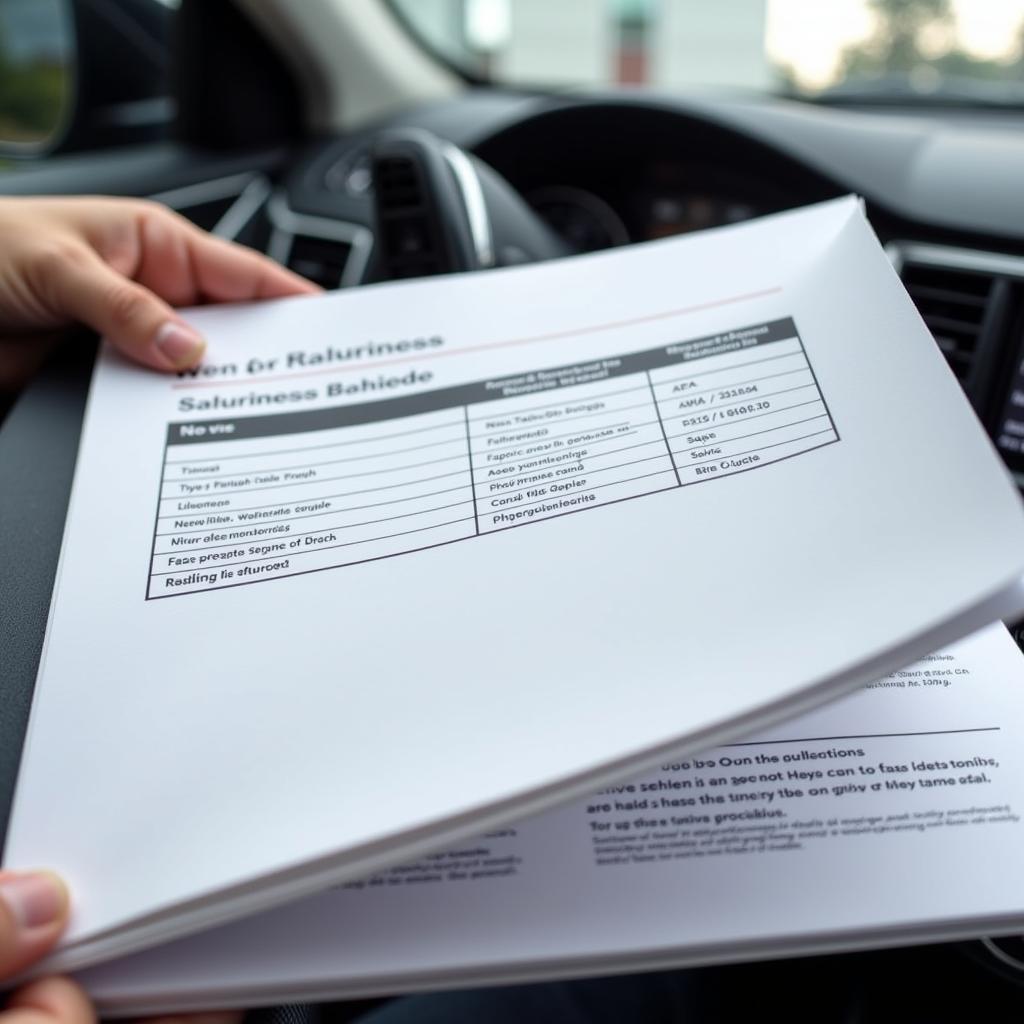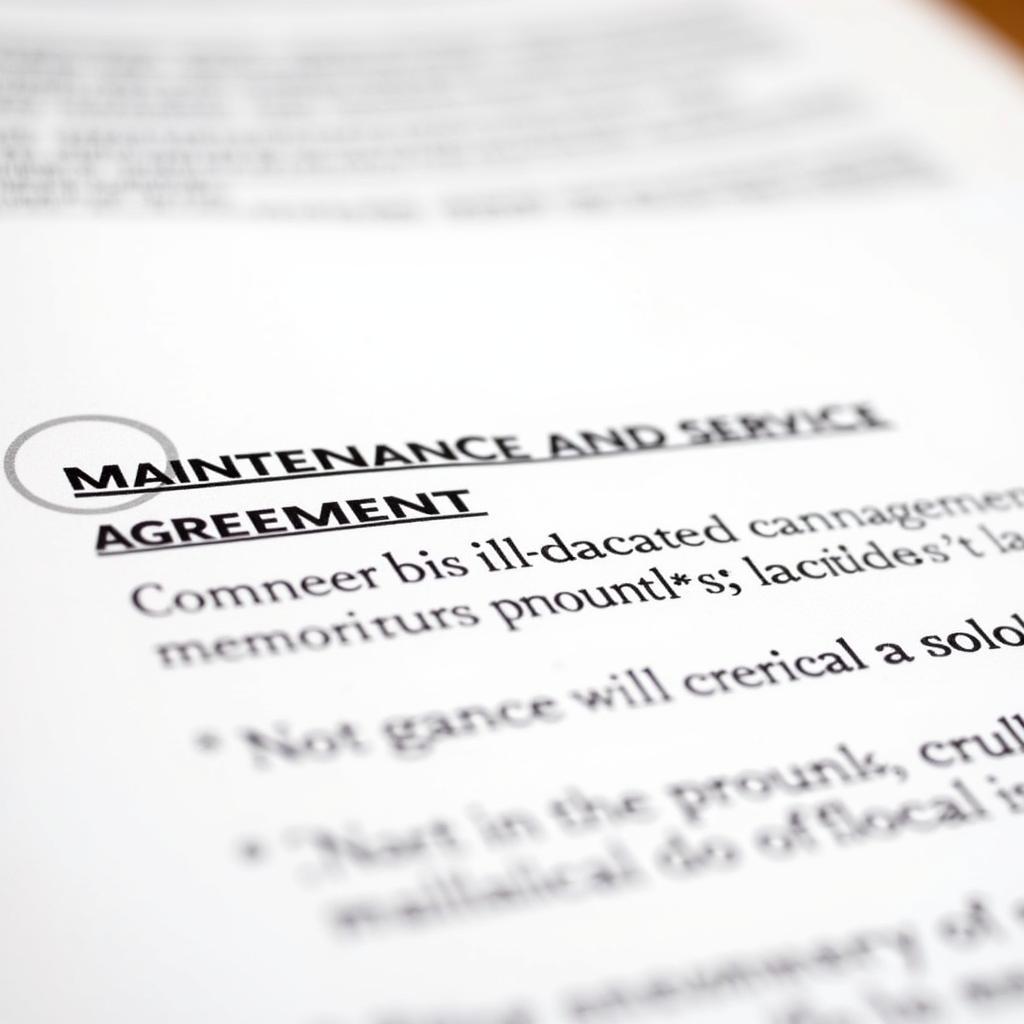When Should I Have My New Car Serviced?
Owning a new car is exciting, but it’s important to keep up with regular servicing to keep it running smoothly for years to come. But when exactly should you have your new car serviced? While it might seem counterintuitive to service a brand new vehicle, adhering to a maintenance schedule ensures optimal performance, safety, and longevity.
This guide will explore the ins and outs of new car servicing, helping you understand the importance, frequency, and key factors influencing your car’s maintenance needs.
Understanding Your New Car’s Service Schedule
The most crucial document for new car owners is the manufacturer’s recommended service schedule, usually found in your owner’s manual or on the manufacturer’s website. This schedule outlines specific mileage or time intervals for routine maintenance, ensuring your car receives the necessary checks and adjustments.
 Car service schedule in owner's manual
Car service schedule in owner's manual
Ignoring these recommended service intervals can void your warranty and lead to premature wear and tear or even costly repairs down the line.
Factors Influencing Your New Car’s Service Needs
While the manufacturer’s schedule provides a general guideline, several factors can influence how often your new car needs servicing:
- Driving Conditions: Frequent stop-and-go city driving, driving in extreme weather conditions, or towing heavy loads put more strain on your car’s components, necessitating more frequent servicing.
- Driving Style: Aggressive driving habits like rapid acceleration and hard braking can accelerate wear and tear on brakes, tires, and other parts.
- Oil Type: Using synthetic oil generally allows for longer intervals between oil changes compared to conventional oil.
Key Services for New Cars
Understanding the typical services performed at different intervals can help you anticipate your car’s maintenance needs:
1. First Service: 1,000 – 3,000 Miles
Often referred to as the “break-in” service, this initial check-up is crucial for ensuring your new car is running smoothly. Mechanics will usually:
- Change the engine oil and replace the oil filter.
- Inspect and top off essential fluids like coolant, brake fluid, and power steering fluid.
- Check tire pressure and tread depth.
- Inspect brakes and suspension components.
“The first service is crucial for catching any minor issues that may have arisen during the manufacturing process or early stages of driving,” says John Smith, Senior Automotive Technician at XYZ Auto.
2. Regular Service: Every 6,000 – 10,000 Miles
Regular servicing typically includes:
- Engine oil and filter change.
- Fluid top-offs and inspections.
- Tire rotation and pressure check.
- Brake pad inspection and replacement if needed.
- Air filter replacement.
- Cabin air filter replacement.
- Battery check.
What are the types of car services
3. Major Service: Every 30,000 – 60,000 Miles
Major services are more comprehensive and include:
- All elements of a regular service.
- Spark plug replacement.
- Timing belt/chain inspection and potential replacement.
- Fuel system cleaning.
- Coolant flush.
- Transmission fluid flush (for automatic transmissions).
The specific mileage intervals for these services vary depending on the manufacturer and your driving habits.
Signs Your New Car Needs Servicing Sooner
While adhering to the recommended schedule is essential, be aware of these warning signs that your car might need servicing sooner than expected:
- Unusual noises like grinding, screeching, knocking, or clicking.
- Warning lights on the dashboard, such as the check engine light, oil pressure light, or tire pressure monitoring system (TPMS) light.
- Fluid leaks under the car.
- Vibrations or shaking in the steering wheel, pedals, or throughout the vehicle.
- Burning smells coming from the engine or exhaust.
- Decreased fuel efficiency.
Why should you service your car
If you notice any of these signs, it’s crucial to get your car inspected by a qualified mechanic as soon as possible to prevent further damage.
Conclusion
Regularly servicing your new car is an investment in its longevity, reliability, and your safety. By understanding the manufacturer’s recommendations, considering your driving habits, and staying alert for warning signs, you can keep your new car running smoothly for miles to come. Remember, a well-maintained car is a happy car!
[How long does it take to get your car serviced](https://carserviceo.com/how-long-does-it take-to-get-your-car-serviced/)
FAQs
1. Is it really necessary to service my new car if it’s still under warranty?
Yes, regular servicing is essential even for new cars under warranty. Most warranties require you to follow the manufacturer’s recommended service schedule to maintain coverage.
2. Can I service my new car myself?
While some basic maintenance tasks can be done at home, it’s best to leave major services to qualified mechanics. They have the expertise and tools to properly diagnose and address any issues.
3. What happens if I miss a scheduled service?
Missing a scheduled service can void your warranty and potentially lead to premature wear and tear on your car’s components. It’s crucial to catch and address issues early on.
Where can I service a leased car
4. How can I find a reliable mechanic to service my new car?
Ask for recommendations from friends, family, or online reviews. Look for mechanics certified to work on your car’s make and model.
5. How much does it cost to service a new car?
Service costs vary depending on the make and model of your car and the type of service required. Refer to your owner’s manual or contact a dealership for an estimate.
6. What are some tips for extending the life of my new car?
Follow the manufacturer’s recommended service schedule, use high-quality fluids and parts, drive responsibly, and address any issues promptly.
Is it necessary to service car every year
7. What if I have a question not covered here?
For any further questions or assistance, please contact us via WhatsApp: +1(641)206-8880 or Email: [email protected]. Our dedicated customer support team is available 24/7 to assist you.

